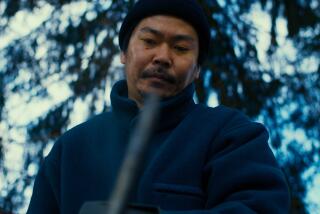‘Maborosi’ Takes Powerful Journey of Spirit
- Share via
Hirokazu Kore-eda’s sublime “Maborosi” opens with a 12-year-old girl trying to persuade her elderly grandmother to come home with her, but the woman is determined to return to her native village, even though she may be entirely without funds. The girl’s mother later tells her not to worry--that it’s not her fault she couldn’t change her grandmother’s mind.
We never do learn what happened to the old woman, but we soon discover this incident has been recurring in the dreams of the granddaughter, Yumiko (Makiko Esumi), now in her 20s. She’s the picture of contentment, living in Osaka in a small apartment over a store with her handsome factory worker husband Ikuo (Tadanobu Asano), as easygoing as she is, and their baby son. Yet Yumiko has these dreams, and the next thing she knows is that out of the blue Ikuo lets himself be killed by a train.
Yumiko’s mother takes charge, and moving ahead in time, we see Yumiko and her son, now a toddler, on a train bound for a fishing village on the Sea of Japan to enter into an arranged marriage with Tamio (Takashi Naitoh), a young widower with a daughter a little older than Yumiko’s son. Tamio is just as good-looking and affable as Ikuo, Yumiko has made a perfect match (and knows it), and the couple’s two kids take to each other instantly.
What’s more, Tamio has a splendid, spacious, traditional Japanese-style house with a spectacular view in an irresistibly picturesque village, where everyone is kind and hearty. What’s going on here with this perfect idyll, so exquisitely observed by Kore-eda, in which life unfolds with a serene and beautiful simplicity?
But when Yumiko returns to Osaka for her brother’s wedding, she inadvertently learns a few more details about the last moments of her first husband’s life, and her delayed reaction to his shocking demise finally hits her hard. Even if she is not fully aware of it, she has at last embarked on a spiritual odyssey in an attempt to discover some meaning in Ikuo’s death.
Kore-eda and his writer, Yoshihisa Ogita, working from Teru Miyamoto’s prize-winning short story, bring to “Maborosi,” which means illusion or mirage, the feel of a classic Yasujiro Ozu film--a feeling heightened by Masao Nakabori’s superb cinematography and Chen Ming-Chang’s plaintive score, one of the year’s most effective.
Kore-eda’s style isn’t as austere as the master’s--nor does it have any need to be--but Kore-eda shares with Ozu an understanding of the power of precisely composed images coupled with an innate sense of how long to hold a shot until it’s suffused with meaning and emotion. Along with D.W. Griffith, Michelangelo Antonioni and Alfred Hitchcock, just to list several giants, Kore-eda understands that the most fully realized films move beyond words to images in creating profoundly, uniquely visual experiences.
Amazingly, “Maborosi” is a first feature, and it so impressed the organizers of the Tokyo International Film Festival that they made the unprecedented gesture of awarding Kore-eda, whose background is in documentaries, a grant of $450,000 toward the making of his next film.
* Unrated. Times guidelines: Thematic elements are too intense and adult for children.
(BEGIN TEXT OF INFOBOX / INFOGRAPHIC)
‘Maborosi’
Makiko Esumi: Yumiko
Takashi Naitoh: Tamio (Yumiko’s second husband)
Tadanobu Asano: Ikuo (Yumiko’s first husband)
Gohki Kashiyama: Yuichi (Yumiko’s son)
A Milestone Film presentation. Director Hirokazu Kore-eda. Producer Naoe Gozu. Executive producer Yutaka Shigenobu. Screenplay by Yoshihisa Ogita; from a story by Teru Miyamoto. Cinematographer Masao Nakabori. Editor Tomoyo Oshima. Costumes Michiko Kitamura. Music Chen Ming-Chang. Art director Kyoko Heya. Set decorator Keiji Akatsuka. Running time: 1 hour, 50 minutes.
* Exclusively at the Nuart through Wednesday, 11272 Santa Monica Blvd., West Los Angeles, (310) 478-6379.
More to Read
The biggest entertainment stories
Get our big stories about Hollywood, film, television, music, arts, culture and more right in your inbox as soon as they publish.
You may occasionally receive promotional content from the Los Angeles Times.










